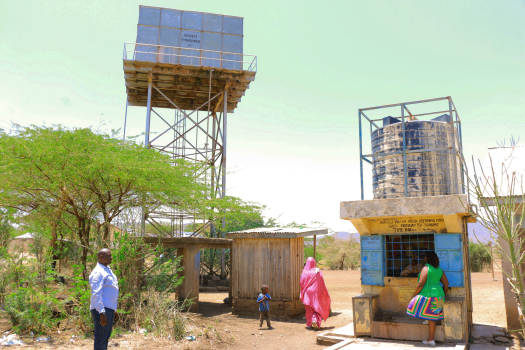World Water Day 2023 is about Accelerating Change. This theme is on the agenda at the United Nations 2023 Water Conference, where leaders gather to reflect on progress toward Sustainable Development Goal 6: water and sanitation for all by 2030. This goal can feel out of reach considering the disparities that continue to exist around the world. However, recent work by the USAID Water, Sanitation, and Hygiene Finance (WASH-FIN) activity to support water service providers (WSPs) in Northern Kenya, provide hope—and a potential way forward—for meeting critical needs and building climate resilience at scale.
WSPs in Kenya, like many elsewhere, suffer from insufficient investment. They have difficulty providing reliable water supply even under normal conditions, but have faced unprecedented challenges in recent years, including an ongoing drought (the country’s worst in 40 years) and the COVID-19 pandemic. These major external shocks have made it even more important for water and sanitation service providers, such as the Isiolo Water and Sanitation Company (IWASCO), which serves the Kenyan County of Isiolo, to find new ways to reduce their costs and build their resilience.
Improving Service and Decreasing Cost
In 2022, USAID supported several WSPs like IWASCO with technical assistance and targeted investments to improve efficiency. For IWASCO, these investments also aimed to improve creditworthiness, bolstering the utility’s ability to invest in and maintain infrastructure beyond the life of the activity. Because IWASCO largely relies on groundwater during the dry season, increasing pumping hours was a critical goal in upgrading and expanding its water services.
IWASCO struggles with high power bills, which prevent the WSP from pumping water to its customers. The company was pumping an average of 16 hours per week only. With this challenge in mind, we identified solarizing water pumps (by placing solar panels on boreholes) as a solution to reduce electricity costs and avoid service outages, with the co-benefits of both increasing climate resilience and supporting renewable energy. We also helped IWASCO replace water meters, reducing non-revenue water. With more than $150,000 in efficiency improvements, USAID has been able to achieve significant results. With these solarized boreholes, IWASCO delivered more water to more customers, with expanded pumping hours up to 48 hours per week, improved quality of service, reduced energy costs by 48 percent, and increased revenues by 20 percent.
Scaling Up – Starting with a Solar Symposium

Photo credit: USAID WASH-FIN
Achieving climate-resilient water security and sanitation that meets human, economic, and ecosystem needs requires both targeted and systems-level approaches. To maximize our investments in IWASCO and other WSPs in Kenya, we knew we needed to share our story to be able to scale it up. With this aim of scaling the impact of our work, USAID hosted a two-day Solar Symposium to provide water service providers across Kenya and the region with the tools and knowledge they needed to make their own solar investments. Attendees learned how solarizing pumping infrastructure can reduce energy costs and improve service reliability. Sessions included design technology, procurement of solar installations, and direct financing options. We also invited commercial banks so they could see the rapid payback of these investments and the potential pipeline of viable lending opportunities in facilitating this investment by WSPs.
The Solar Symposium coincided with the close of WASH-FIN. Now that USAID has begun its follow-on initiative, WASH-FIN 2, we have the tools in place to start bringing innovative projects like our work with IWASCO to a global scale. As we celebrate World Water Day—and recognize the importance of water every day—we are prepared to accelerate change in meeting water needs while promoting climate change goals.

Photo credit: USAID WASH-FIN

About the Author
Alyssa Boyer is Chief of Party, USAID’s WASH-FIN 2 program. USAID’s WASH-FIN 2 team will present this case at the Global Water Operator Partnerships Alliance (GWOPA) Congress in Bonn, Germany in May 2023, and will be demonstrating the ability to create investible project structures to enable utility solarization at scale at climate finance-focused events over the next months.


